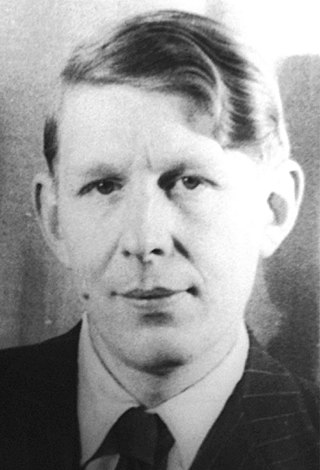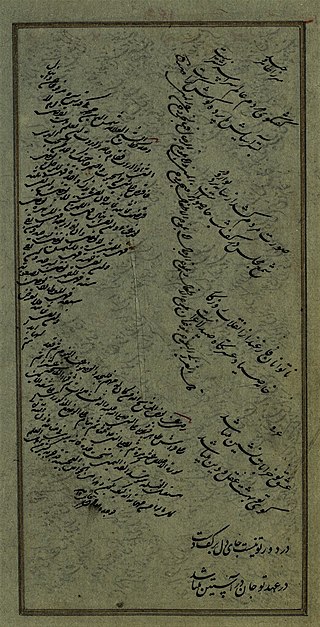Related Research Articles

Wystan Hugh Auden was a British-American poet. Auden's poetry was noted for its stylistic and technical achievement, its engagement with politics, morals, love, and religion, and its variety in tone, form, and content. Some of his best known poems are about love, such as "Funeral Blues"; on political and social themes, such as "September 1, 1939" and "The Shield of Achilles"; on cultural and psychological themes, such as The Age of Anxiety; and on religious themes such as "For the Time Being" and "Horae Canonicae".

Paul Muldoon is an Irish poet. He has published more than thirty collections and won a Pulitzer Prize for Poetry and the T. S. Eliot Prize. At Princeton University he is currently both the Howard G. B. Clark '21 University Professor in the Humanities and Founding Chair of the Lewis Center for the Arts. He held the post of Oxford Professor of Poetry from 1999 to 2004 and has also served as president of the Poetry Society (UK) and Poetry Editor at The New Yorker.

Princeton University Press is an independent publisher with close connections to Princeton University. Its mission is to disseminate scholarship within academia and society at large.

Charles Kenneth "C. K." Williams was an American poet, critic and translator. Williams won many poetry awards. Flesh and Blood won the National Book Critics Circle Award in 1987. Repair (1999) won the 2000 Pulitzer Prize for Poetry, was a National Book Award finalist and won the Los Angeles Times Book Prize. The Singing won the 2003 National Book Award and Williams received the Ruth Lilly Poetry Prize in 2005. The 2012 film The Color of Time relates aspects of Williams' life using his poetry.

Rabia Balkhi, also known as Rabia al-Quzdari was a 10th-century writer who composed poetry in Persian and Arabic. She is the first known female poet to write in Persian.

Reza-Qoli Khan Hedayat was a Persian literary historian, administrator, and poet in 19th-century Qajar Iran.

Tracy K. Smith is an American poet and educator. She served as the 22nd Poet Laureate of the United States from 2017 to 2019. She has published four collections of poetry, winning the Pulitzer Prize for her 2011 volume Life on Mars. Her memoir, Ordinary Light, was published in 2015.

Vahshi Bafqi was a Persian poet of the Safavid era, considered to be one of the greatest of his generation.

Kamal Khujandi, also Kamal Khojandi, Kamaleddin Khojandi, or Kamal-E Khojandi, was a Persian Sufi and Persian ghazal poet of the 14th century.

Literature is any collection of written work, but it is also used more narrowly for writings specifically considered to be an art form, especially prose fiction, drama, and poetry. In recent centuries, the definition has expanded to include oral literature, much of which has been transcribed. Literature is a method of recording, preserving, and transmitting knowledge and entertainment, and can also have a social, psychological, spiritual, or political role.

Saib Tabrizi was an Iranian poet, regarded as one of the greatest masters of a form of classical Persian lyric poetry characterized by rhymed couplets, known as the ghazal. He also established the "Indian style" in the literature of his native language, Azerbaijani Turkic, in which he is known to have written 17 ghazals and molammaʿs.

Jamāl-al-Din Moḥammad Sidi (1555–1591) was a Persian poet. He lived from 963 AH-999 AH; c. 1556-1590 CE; known by his pen-name Urfi, or Orfi or Urfi Shirazi, was a 16th-century Persian poet.

Mirza Mohammad Taher Vahid Qazvini, was a Persian bureaucrat, poet, and historian, who served as the grand vizier of two Safavid monarchs, Shah Suleiman and the latter's son Soltan Hoseyn from 1691 to 1699.

The Riddles of Amir Khusrow were developed during the royal courts of more than seven rulers of the Delhi Sultanate. During this time, Khusrow wrote not only many playful riddles, but songs and legends which have been a part of popular culture in South Asia ever since. Additionally, his riddles and songs and legends are considered to be an important early witness to the Hindustani language. His riddles in particular involve fun double entendre or, wordplay. Innumerable riddles by this poet are being passed through oral tradition for the past seven centuries with a notable increase in recent times. However, there is some debate about whether Khusrow was the real author of the riddles attributed to him; some riddles transmitted under his name concern subjects which did not exist in Khusrow's own time, such as the gun and hookah.

Yaqub b. Uzun Hasan or Abū al-Muẓaffar Yaʿqūb Bahādur Ḫān, commonly known as Sultan Ya'qub was the ruler of the Aq Qoyunlu from 1478 until his death in 24 December 1490. A son of Uzun Hasan, he became the ruler of the dynasty after the death of his brother Sultan Khalil. The borders of Aq Qoyunlu dynasty remained stable during his reign. In his book Alam-Aray-i Amini, Fazlallah Khunji Isfahani praised him as a decent successor of Uzun Hasan. Ya'qub received praise from other historians for supporting poets and scientists.
Badr Shirvani was a Persian poet. He spent most of his career at the court of the Shirvanshahs, but received patronage from other rulers as well.
Mirza Jalal Mohammad, who is best known as Asir-e Esfahani (Asir) and Shahrestani, was a Persian poet in 17th-century Safavid Iran. He was an innovative writer whose oeuvre contains examples of all conventional Persian poetic forms, a grandee at court and a son-in-law of Shah ("King") Abbas the Great.
Paul E. Losensky is Professor of Comparative Literature and Adjunct Professor of Middle Eastern Languages and Cultures at Indiana University. He received his PhD in Near Eastern Languages and Civilizations from the University of Chicago in 1993. Losensky specializes in Persian literature and literary history.
Baba Fighani Shirazi was a Persian poet active in the late 15th and early 16th centuries. Born and raised in the southern city of Shiraz, Fighani belonged to a family of craftsmen, working as a cutler for his father and brother during his youth. It is unknown how Fighani how rose to prominence as a poet, but by the time the Aq Qoyunlu Ya'qub Beg ruled, he had become a notable figure, and was thus was given the honorific title of bābā shāʿir or bābā al-shuʿarā by the latter.

Amir Shahi Sabzavari was a Persian poet who flourished in 15th-century Timurid Iran. He was descended from the Sarbadars of Sabzevar.